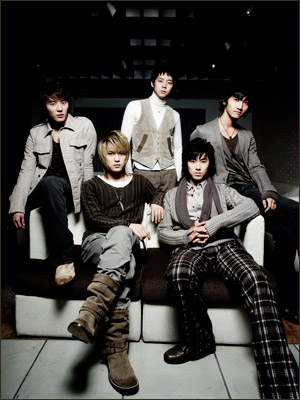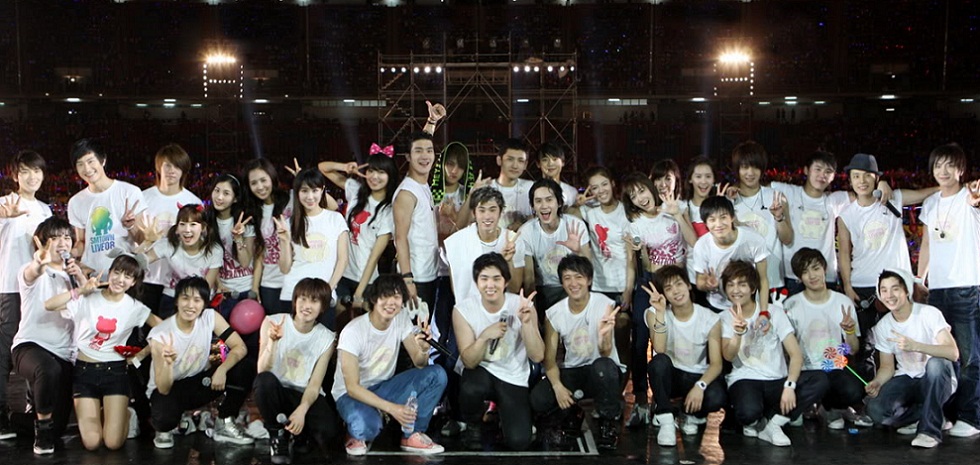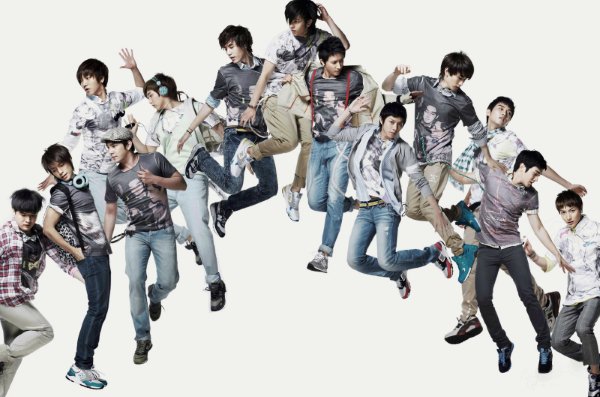 Although everyone here at Seoulbeats — from the authors, to the readers, to the occasional troll — has established that despite the K-media’s laughable attempts to convince us that K-Pop’s recent expansion into the west does not say much in terms of actual impact on the music scene, one cannot deny that it has accumulated quite a strong niche following. With the sudden popularity of ‘Boys Over Flowers’ in 2009 causing a large hoard of ‘newbie’ fans to come running into the K-Pop scene, we can witness the change occurring around us. Argue if you will, but I guarantee that three-four years ago, had SM attempted to hold an SMTOWN in New York City, the turn out would be significantly less than the crowds seen at the concert held only a month ago.
Although everyone here at Seoulbeats — from the authors, to the readers, to the occasional troll — has established that despite the K-media’s laughable attempts to convince us that K-Pop’s recent expansion into the west does not say much in terms of actual impact on the music scene, one cannot deny that it has accumulated quite a strong niche following. With the sudden popularity of ‘Boys Over Flowers’ in 2009 causing a large hoard of ‘newbie’ fans to come running into the K-Pop scene, we can witness the change occurring around us. Argue if you will, but I guarantee that three-four years ago, had SM attempted to hold an SMTOWN in New York City, the turn out would be significantly less than the crowds seen at the concert held only a month ago.
However, one thing people must note when discussing the popularity of K-Pop, is that to many people, whether they realize it or not, K-Pop has almost simply become a fad. Meaning that despite the fact it is at its peak of popularity, it will once again start heading on a downhill slope. Of course, I’m sure none of us here will be completely enamored by Korean Pop for the rest of our lives. We will all have to move on, get jobs, start a family , and you know– maybe we will check up on our biases/favorite bands every now and then. Maybe keep some of our physical albums simply for sentimental value. We may even check out if any of the predictably fifty new acts saturating K-Pop are any good. But for the most part, I doubt many of us will be actively partaking in the dissection and commitment of Korean pop culture like we do now.
When I say fad, I don’t mean people who slowly fall out of love with something. I mean people who jump on the bandwagon because it’s popular– and then hop off after the novelty of the whole thing wears off. I see it happening all around me. Classmates who once used to tease me because my Asian husband danced like a third-rate hooker, are now the same ones who have pictures of shirtless (and pantless) Siwon adorning their iPhone screens (yeah, who’s judging who now, huh?!).
Honestly, there is nothing wrong with falling into fads. It happens to everyone. It has happened to me plenty of times. But what’s sad is that the Korean Media genuinely believes that this fad-tastic wave which is hitting the world so hard, is going to reap long term benefits to Korea’s global standing or whatever. When really, to everyone else who hasn’t fallen victim to the K-Pop fad, things look quite different. For example: the legendary ‘Gods of the East’, or DBSK as we know them. The famous quintet which reignited the idol flame and is known as the most well-rounded boy band ever? The one who’s respected by the music industry, sunbaes and hooboes alike. Yeah, them? Well, to everyone else they just look like a group of five Justin Biebers. And it’s pretty sad that the statement isn’t entirely untrue– but that’s an OP-ED for another day.
An interview conducted by Australian morning show ‘Sunrise’, prompted by the response to the ‘Sydney November K-Pop Fest’ Yeah, the one I didn’t go to… sums the general gist of K-Pop in the global sense pretty nicely (also, note the rabid fans being interviewed, these are the people representing us…):
[About SNSD] They’re K-Pop royalty, worth tens of millions of dollars, with fans all over the world. But the thing is… you’ve probably never heard of them.[youtube http://www.youtube.com/watch?v=rZ7s9dJ-pI4]Contrary to popular belief, I do think that the Hallyu wave is some kind of a success. It definitely plays a large part in the process of globalisation, especially that in creating worldly awareness of Korea’s culture, even if indirectly — but the thing is, I don’t think South Korea is aiming for that. Their obsession with expanding its presence is so overbearing, it’s as if what they want to achieve is world wide domination. And there are many ways in which they can go about doing so — but relying on the Pop industry is almost pitiful. Because Pop is popular. Popularity dies. K-Pop is just ‘the next new thing’, which appeals to the shallow side of most people (once again, not necessarily a bad thing. In my opinion, pretty much everyone who loves K-Pop is shallow in someway). And only about 40% of the time will that shallow interest turn into genuine investment. For everyone else, K-Pop is a fad that will die soon, and when it dies, so will half the fandom.
So the question is, when will it die?
The answer came to me whilst watching previously mentioned classmates flipping through the photobook for Super Junior’s SS3. One of my more cynical, hipster like peers stood judging us, and made the off-hand, but so true comment ‘Urgh. K-Pop is such a fad. Just wait until one of those thirteen eunuchs get married. But there’ll probably be a new fad to join then, like Libyan Pop or something‘. Rude? A bit. Slightly offensive? Yeah. But true? Pretty much.
The bands which carry the largest amount of international appeal at the moment are arguably the older bands — the ones which debuted before the idol group saturation we see happening in front of us today. Bands such as BIG BANG, DBSK, Super Junior, SNSD, and the more recent bands, SHINee, and 2PM to some extent. Of course, newer bands such as B2ST, INFINITE, and 2NE1 have accumulated a strong fanbase (especially that of 2NE1), but can it compare to the number of international fans enamored by the former groups? Not really. And the thing is, most of those former groups have almost reached their ‘expiration date’, SHINee and 2PM are the most recent of the bunch, and they’re already three years into their debut! Hypothetically speaking, if the five year curse still holds true for these groups, then SHINee and 2PM both only have really another two/three years of being in their prime before they become obsolete. And by then god knows what will have happened to Big Bang, Super Junior, SNSD, and DBSK.
From what I’ve seen, most people only really hardcore stan a few bands, and then semi-support a bunch of other ones. For certain new fans, this trend is even stronger. Where to them K-Pop only really revolves around their bias bands. And when their bias bands disintegrates, what do they have left for them? I’ve seen Cassies who were once devoted to K-Pop for a good few years, almost completely lose interest a year or so after the whole lawsuit drama. And these were Cassies who were pretty die-hard in their stanning. Cassies who, although also supported bands like SHINee and B2ST, did not love them to the extent that it kept their K-Pop fire burning. I think this can also apply to a large portion of people who jumped into K-Pop because it’s ‘in’ — especially ones to which K-Pop is merely ‘BigBang/SuJu/DBSK/SNSD and the Pussycats’. Case in point: the sheer number of post-2009 fans that really do undermine the popularity and significance of the Wonder Girls in Korea. When their recent comeback has proved that they still have a strong fandom to be reckoned with.
Personally speaking, I like a lot of K-Pop bands. But thinking of it now, if Big Bang really did implode soon, and when DBSK and Super Junior all leave for the army, I can definitely see more than half of my passion for Korean Pop dwindling. A lot of people compare K-Pop to that of anime, and in all honesty, it’s a fair comparison in a lot of ways. But one thing you have to note is this — when an anime/manga series ends, we can move on. There are literally thousands of stories awaiting us. Jumping fandoms is as easy as skipping rope. When your favourite band ends however… well, it’s not the same. These are people. People who can’t be easily replaced by other people. And although many of us refuse to admit such, there is a significant amount of sentimentality and emotional investment that just happens when we choose to stan the bands we stan. I love SNSD, KARA, After School, 2NE1, MBLAQ, INFINITE, and 2PM. But I can not see myself being as attached to them the way I am with my big bias bands.
This emotional investment that agencies and idols alike are so insistent on forging — may prove the be the downfall of K-Pop’s strong fandom as we know it. You can argue that ‘Hey! K-Pop is music! There are loads of different bands which make good music in K-Pop!’. Well, okay sure. But let’s be realistic people. Who here really likes K-Pop just for the music? Actually, I’m sure there are a few exceptions that do love K-Pop for what it is — Korean Pop. But the exceptions do not make the majority. Just look at the fans interviewed in the ‘Sunrise’ segment — “[K-Pop] is a lifestyle!”. The emotional investment we put into our bands may be beneficial for the band’s career in the short term. But in the grand ‘Hallyu’ scheme of things, it doesn’t do much good at all. What it does is make it harder for us to embrace new bands, harder for us to embrace Korean Pop for what it is… Pop music.
People talk about the older bands becoming obsolete as being ‘the end of an era‘. More than being an end of an era, I say it’s the end of a big fad. And the crash of the second occurrence of the Korean Wave.





